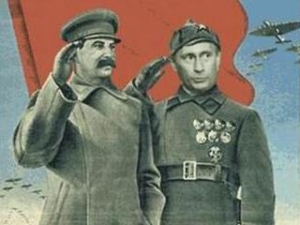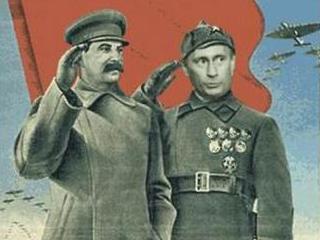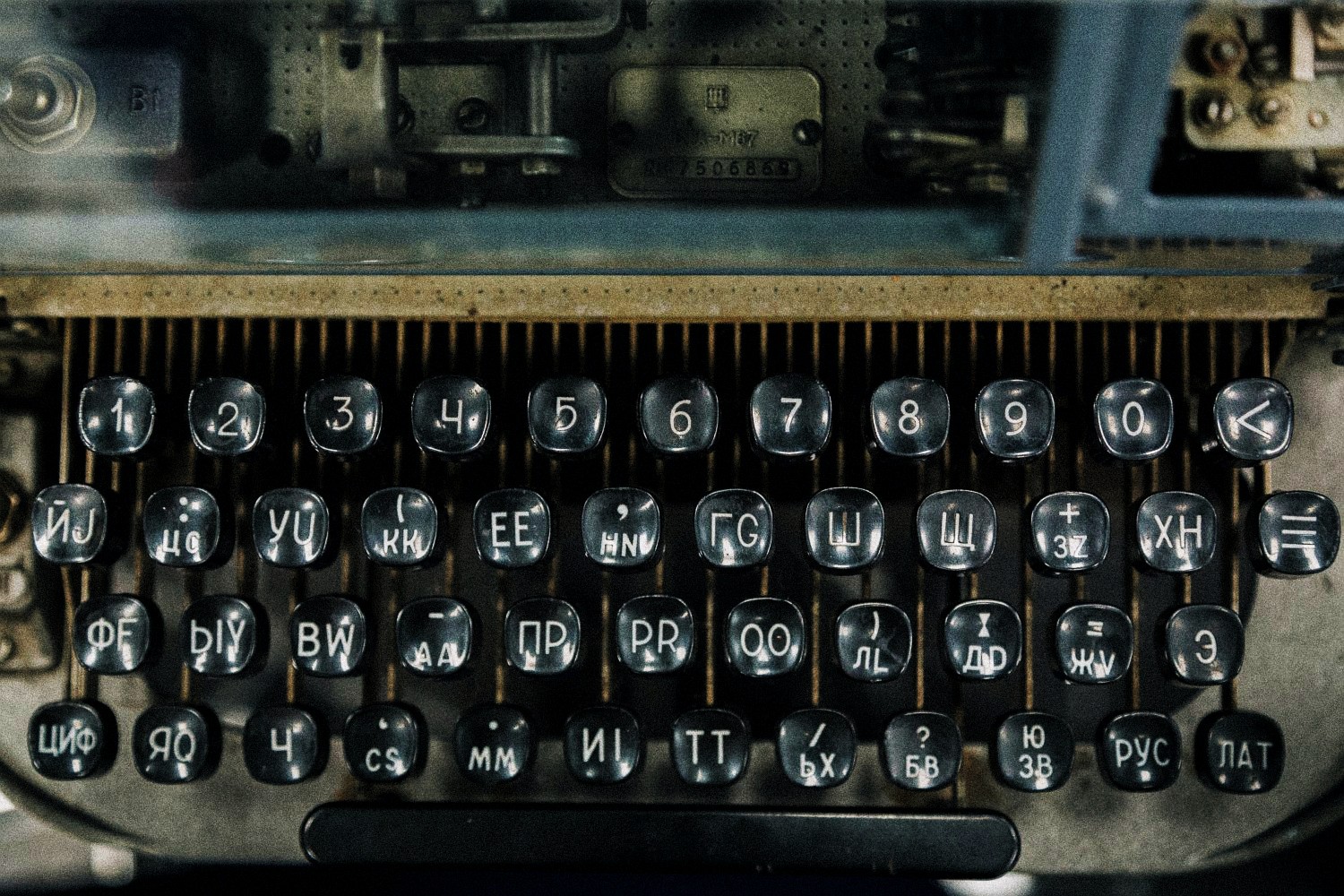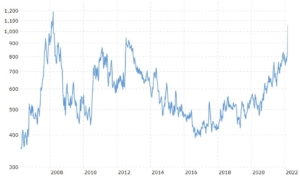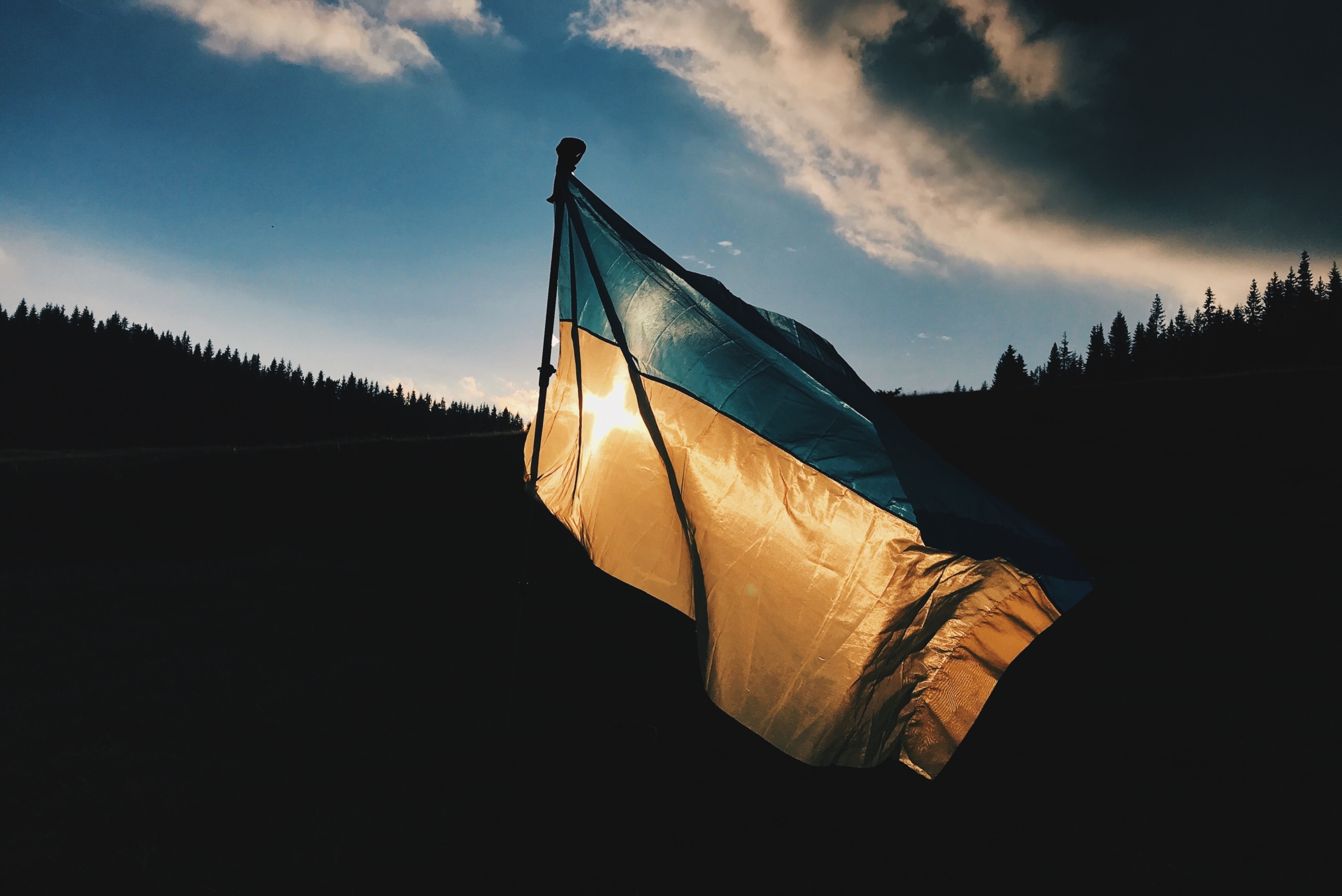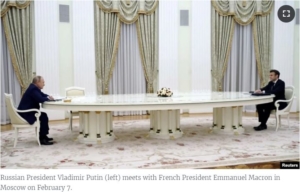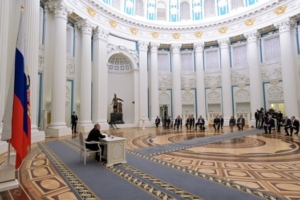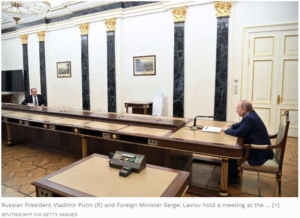[NB: check the byline as usual, thanks. /~Rayne]
Russia continued bombing Ukraine this weekend, as you’re no doubt well aware.
On Friday I wrote about a world war of attrition, in which Russia’s economy appears fucked in tandem with Russia’s Aleppo-style attack on Ukrainian cities.
It’s not clear whether a majority of the Russian public knows what’s going on and how badly they will be affected by economic sanctions, thanks to Putin’s stranglehold on independent news media and social media. We’ve seen brave protesters in large numbers in Moscow, St. Petersburg, and several other cities but the sentiment of Russians outside urban centers isn’t readily accessible.
While Putin continues his steady genocidal obliteration of Ukraine’s cities, the pointy end of this war of attrition is coming around toward Russia.
~ ~ ~
I want to share and discuss something published on Twitter and shared in Pastebin which may shed light on the how, what, and why of the Russian invasion.
MASSIVE CAVEAT: The letter which follows is believed to be the assessment of a current FSB employee. Christo Grosev, executive director of Bellingcat, sought validation of the letter’s origins.
This is not an assurance on my part of the letter’s source or its contents. Grosev’s investigation, though, allows readers to weight the authenticity of the letter and and its content. Team Bellingcat has been extremely reliable in its open source intelligence. /END CAVEAT
If this letter is a very good psyop — one which Grosev and his FSB contacts couldn’t detect easily — and is instead the work of a Russian active measure intended to influence the west, how would Putin expect it work on us, especially if the best, most effective influence operations contain truth mixed with disinformation?
Which portions of this are more likely to be true than not if it is a psyop? What indicators would validate those portions which might be true?
If this letter and its assessment is wholly true, what are the likely next failures we’ll see in Russia?
| 1 |
One of the insiders from the Russian special services, I will publish without edits or censorship, because it’s hell: “I’ll be honest: I almost did not sleep all these days, almost all the time at work, my head is a bit floating, like in a fog. And from overwork sometimes already catching states, as if it’s all not real. |
| 2 |
Frankly speaking, Pandora’s Box is open – by summer a real horror of world scale will start – global famine is inevitable (Russia and Ukraine were the main grain suppliers in the world, this year’s harvest will be smaller, and logistical problems will bring the disaster to its peak). |
| 3 |
I cannot tell you what guided the decision to operate, but now all the dogs are methodically brought down on us (the Service). We are scolded for being analytical – this is very much in my line of work, so I will explain what is wrong. |
| 4 |
We have been under increasing pressure lately to adjust reports to the requirements of management – I once touched on this subject. All these political consultants, politicians and their entourage, influence teams – it’s all been creating chaos. A lot of it. |
| 5 |
Most importantly, no one knew that there would be such a war, it was hidden from everyone. And here is an example: You are asked (conventionally) to calculate the possibility of human rights in different conditions, including a prison attack by meteorites. You specify the meteorites, and you are told that this is just a reinsurance for calculations, there will be nothing like that. You understand that the report will be only for a tick, but it must be written in a victorious style, so that there would be no questions, saying, why do you have so many problems, did you not work well? In general, you write a report that in the fall of a meteorite, we have everything to eliminate the consequences, we are good, all is well. And you concentrate on the tasks that are real – we do not have enough strength. And then suddenly really throw meteorites and expect that everything will be on your analysis, which were written from the ball. |
| 6 |
That’s why we have total fuck-ups – I don’t even want to choose another word. There is no defense against sanctions for the same reason: Nabiullina may well be found guilty of negligence (more likely the point men on her team), but what is their fault? No one knew that there would be such a war, so no one was prepared for such sanctions. This is the flip side of secrecy: since no one told anyone, who could have calculated what no one told? |
| 7 |
Kadyrov’s going off the rails. There was almost a conflict with us, too: the Ukrainians may have planted the lie that we had given up the routes of Kadyrov’s special units in the first days of the operation. They were killed in the most horrific way, they hadn’t even begun to fight yet, and they were simply torn apart in some places. And so it went: the FSB leaked the routes to the Ukrainians. I do not have such information, I will leave 1-2% for the reliability (you can not completely exclude it either). |
| 8 |
The blitz has failed. It is simply impossible to accomplish the task now: if in the first 1-3 days they had captured Zelensky and government officials, seized all the key buildings in Kiev, let them read the order to surrender – yes, the resistance would have subsided to a minimum. Theoretically. But then what? Even with this ideal scenario, there was an unsolvable problem: with whom to negotiate? If we tear down Zelensky, all right, with whom would we sign agreements? If with Zelensky, then these papers won’t be worth anything after his demolition. OPZJ refused to cooperate: Medvedchuk is a coward, he ran away. There is a second leader there – Boyko, but he refuses to work with us – even his own people won’t understand him. We wanted to bring Tsarev back, but even our pro-Russian ones have turned against us. Should we bring back Yanukovych? How can we do that? If we say that we can’t occupy him, then all our government will be killed 10 minutes after we leave. Occupy? And where are we going to get so many people? Commandant’s office, military police, counterintelligence, guards – even with the minimum resistance from the locals we need 500 thousand or more people. Not counting the supply system. And there is a rule of thumb that by overriding quantity with poor management you only ruin everything. And that, I repeat, would be under an ideal scenario, which does not exist. |
| 9 |
What about now? We can’t declare a mobilization for two reasons: |
| 10 |
1) Large-scale mobilization would undermine the situation inside the country: political, economic, social. |
| 11 |
2) Our logistics are already overstretched today. We will send a much larger contingent, and what will we get? Ukraine is a huge country in terms of territory. And now the level of hatred towards us is off the charts. Our roads simply can’t absorb such supply caravans – everything will come to a standstill. And we will not be able to manage it, because it is chaos. |
| 12 |
And these two reasons are falling out at the same time, although even one is enough to break everything. |
| 13 |
As for losses: I do not know how many. Nobody knows. The first two days there was still control, now no one knows what’s going on there. It is possible to lose large units from communication. They may be found, or they may be dispersed because they were attacked. And even their commanders may not know how many are running around, how many have died, how many have been taken prisoner. The death toll is definitely in the thousands. It can be 10 thousand, it can be 5, and it can be only 2. Even at headquarters they don’t know that for sure. But it should be closer to 10. And we are not counting the LNRD corps right now – they have their own count. |
| 14 |
Now, even if we kill Zelensky and take him prisoner, nothing will change. Chechnya is there by the level of hatred towards us. And now even those who were loyal to us are against it. Because they were planning on above, because we were told that such an option will not happen, unless we are attacked. Because we were told that we must create the most credible threat in order to agree peacefully on the right terms. Because we initially prepared protests inside Ukraine against Zelensky. Without regard to our direct entry. An invasion, to put it simply. |
| 15 |
Further, civilian losses will go exponentially – and resistance to us will only increase, too. We have already tried to enter the cities with infantry – out of twenty landing groups, only one was a tentative success. Remember the storming of Mosul – that was the rule in all countries, nothing new. |
| 16 |
To keep it under siege? According to the experience of military conflicts in Europe in recent decades (Serbia is the largest testing ground here), cities can be under siege for years, and even function. It is only a matter of time before humanitarian convoys from Europe get there. |
| 17 |
We have a conditional deadline of June. Conditional – because in June we have no economy, nothing left. By and large, next week will begin to turn to one side, simply because the situation cannot be in such overdrive. There is no analytics – you can’t calculate the chaos, no one can say anything for sure here. Acting on intuition, and even on emotion – but this is not poker. The stakes will be raised, hoping that suddenly some option will shoot through. The trouble is that we too can now miscalculate and lose everything in one move. |
| 18 |
Basically, the country has no way out. There is simply no option for a possible victory, and if we lose – that’s it, we’re screwed. Then they decided to kick weak Japan and get a quick win, then it turned out that the army was a disaster. Then they started a war to the bitter end, then they took the Bolsheviks to “re-educate” them in the army – they were outcasts, nobody was interested in them in the masses. And then nobody really knew the Bolsheviks picked up anti-war slogans and they went crazy… |
| 19 |
On the plus side: we did everything to prevent even a hint of mass sending of the “fine men” to the front line. Send there cons and “socially unreliable”, political (so they don’t muddy the water inside the country) – the morale of the army will simply go down the drain. And the enemy is motivated, motivated monstrously. They know how to fight, they have enough middle-ranking commanders. They have weapons. They have support. We will simply create a precedent for human losses in the world. That’s all. |
| 20 |
What we fear the most: they are acting on the rule of overlapping an old problem with a new one. This was largely the reason for the start of Donbass in 2014 – it was necessary to draw the attention of Westerners away from the Russian spring in Crimea, so the Donbass crisis was supposed to draw all the attention to itself and become a bargaining chip. But even bigger problems started there. Then they decided to sell Erdogan on the four pipes of South Stream and went into Syria – this was after Suleimani gave deliberately false inputs to solve his problems. As a result, we failed to solve the problem with the Crimea, there are problems with Donbass too, South Stream has shrunk to 2 pipes, and Syria is another headache (if we go out, they will bring down Assad, which will make us look idiots, but it will be hard and useless to sit still). |
| 21 |
I don’t know who came up with the “Ukrainian blitzkrieg.” If we were given real inputs, we would at the very least point out that the original plan is moot, that we need to double-check a lot of things. A lot of things. Now we are up to our necks in shit. And it’s not clear what to do. “Denazification” and “demilitarization” are not analytical categories, because they have no clearly formed parameters by which to determine the level of accomplishment or non-fulfillment of the assigned task. |
| 22 |
Now all that remains is to wait for some fucked-up advisor to convince the upper echelons to start a conflict with Europe with a demand to lower some sanctions. Either they lower the sanctions or they go to war. And if they refuse? Now I don’t rule out that then we’ll get into a real international conflict like Hitler did in 1939. And we would then get our Z’s flattened with a swastika. |
| 23 |
Is there a possibility of a local nuclear strike? Yes. Not for military purposes (it won’t do anything – it’s a defense breakthrough weapon), but to intimidate the rest. At the same time the ground is being prepared to turn everything over to Ukraine – Naryshkin and his SVR are now digging the ground to prove that they secretly created nuclear weapons there. They are hammering on what we have studied and analysed on bones long time ago: the proofs cannot be drawn up on a knee-high, and the availability of specialists and uranium (Ukraine is full of depleted isotope 238) is of no importance. |
| 24 |
[blank space] |
| 25 |
“And the fact that their old nuclear power plants can yield weapons-grade plutonium (plants like REB-1000 give it in minimal quantities as a “by-product” of the reaction) – so the Americans have introduced such controls there with the involvement of the IAEA that it is silly to discuss the topic. |
| 26 |
Do you know what will start in a week? Well, even in two weeks. We’re going to be so caught up that we’re going to miss the hungry ’90s. While the auction was closed, Nabiullina seems to be making normal steps – but it’s like plugging a hole in the dam with a finger. It will still burst, and even stronger. Nothing will be solved in three, five or ten days. |
| 27 |
Kadyrov doesn’t just hoof it for a reason – they have their own adventures there. He’s created an image of himself as the most powerful and invincible. And if he falls once, he’ll be brought down by his own people. He will no longer be the master of the victorious clan. |
| 28 |
Let’s move on. Syria. “The guys will hold out, everything will be over in Ukraine – and there in Syria we will reinforce everything by positions again. And now at any moment they can wait there when the contingent runs out of resources – and such a heat will go… Turkey is blocking the straits – airlifting supplies there is like heating an oven with money. |
| 29 |
Note – all this is happening at the same time, we do not even have time to put it all in one pile. Our situation is like Germany’s in ’43-’44. At the start all at once. Sometimes I am already lost in this overwork, sometimes it seems that everything was a dream, that everything is as it was before. |
| 30 |
On prisons, by the way, it’s going to get worse. Now they’re going to tighten the screws until they bleed. Everywhere. To be honest, then purely technically it’s the only chance of containing the situation – we’re already in a total mobilization mode. But we can’t stay in such a mode for long, and our timetable is unclear, and it will only get worse. Mobilization always makes management lose its way. And just imagine: you can run a hundred meters in a sprint, but to go into a marathon race and run as hard as you can is bad. Here we are with the Ukrainian question rushed, as on a hundred meters, and fit into a cross-country marathon. |
| 31 |
And that’s a very, very brief description of what’s going on. |
| 32 |
The only cynical thing I can add is that I do not believe that VV Putin will press the red button to destroy the whole world. |
| 33 |
First of all, there is not one person who makes the decision, at least someone will jump out. And there are many people there – there is no “single red button”. |
| 34 |
Secondly, there are some doubts that everything successfully functions there. Experience shows that the higher the transparency and control, the easier it is to identify deficiencies. And where it is unclear who and how controls, but always bravura reports – everything is always wrong there. I am not sure that the red button system is functioning as declared. Besides, the plutonium charge has to be replaced every 10 years. |
| 35 |
Thirdly, and most disgusting and sad, I personally do not believe in the willingness to sacrifice a man who does not let his closest representatives and ministers near him, nor the members of the Federation Council. Whether out of fear of coronavirus or attack, it doesn’t matter. If you are afraid to let your most trusted ones near you, how will you dare to destroy yourself and your loved ones inclusive? |
| 36 |
Ask me anything, but I may not answer for days at a time. We’re in rush mode, and we’re getting more and more tasked. |
| 37 |
On the whole, our reports are upbeat, but everything goes to hell. |
| 38 |
Never before has this source Gulagu[.]net swear, wrote briefly and to the point. But now even he… |
Legend:
the Service — the Federal Security Service of the Russian Federation or FSB, successor counterintelligence and security agency to USSR’s KGB
Nabiullina — Elvira Nabiullina, chair of Bank of Russia (since 2013, before Euromaidan and subsequent incursion into Donetsk and Luhansk regions in eastern Ukraine).
Kadyrov — Ramzan Kadyrov, head of the Chechen Republic (since 2007); also a member of the Advisory Commission of the State Council of the Russian Federation.
blitz — slang for Blitzkrieg
Medvedchuk — Viktor Medvedchuk, People’s Deputy of Ukraine (since August 2019), chair of pro-Russian entity Ukrainian Choice; an oligarch who calls Putin a “personal friend”; Putin is godfather to Medvedchuk’s daughter Daryna. Currently under house arrest for “treason and attempted looting of national resources.”
OZPH — Opposition Platform for Life, the party to which Medvedchuk belongs.
Boyko — Yuriy Boyko, former Vice Minister of Ukraine (2012-2014).
Tsarev — Oleg Tsaryov, former People’s Deputy of Ukraine representing pro-Russian Party of Regions; Speaker of the Unity Parliament for Donetsk and Luhansk regions in eastern Ukraine.
Yanukovych — Viktor Yanukovych, pro-Russian fourth president of Ukraine from 2010 until removal during 2014 Maidan Revolution.
LNRD corps — component of Russian ground forces, believe this is personnel in Luhansk and Donetsk regions (TBD, subject to revision).
storming of Mosul — believed to refer to 2017 Battle of Mosul against ISIS consisting of urban warfare in a dense urban environment. (Two US military “lessons learned” papers on Battle of Mosul: The Mosul Study Group and the Lessons of the Battle of Mosul (longer); Five Operational Lessons (shorter).)
Donbass — Donbas, the Donetsk and Luhansk regions of eastern Ukraine, Russian occupied since 2014.
Crimea — Peninsular region of southern Ukraine illegally annexed by Russia in 2014.
Suleimani — Qasem Soleimani, major general of Iran’s army, assassinated in 2020 on order of Donald Trump.
South Stream — Natural gas pipeline project which was to run west from Russia through the Black Sea to Europe, canceled in 2014.
Naryshkin — Sergey Naryshkin, director of the SVR since 2016.
SVR — Foreign Intelligence Service of the Russian Federation, Russia’s intelligence agency.
depleted isotope 238 — Depleted uranium, the product of processing natural uranium for nuclear power plant fuel and nuclear weapons.
REB-1000 — unclear, likely a reference to the Chernobyl nuclear power plant.
Federation Council — Senat of the Federal Assembly, Russia’s legislative body.
Gulagu(.)net — Human rights NGO focused on prisoners’ rights and prison abuses in Russia, founded by Vladimir Osechkin. (See Oct 2021 article regarding this organization and a key conflict with Russian government.)
~ ~ ~
The letter supports other indicators Russia’s invasion of Ukraine was a tightly-held secret. There have been anecdotes of conscripts and non-military personnel who were told they were going on an exercise only to find themselves ordered to invade Ukraine. This may have been a key reason why the Russians deployed had no cell phones — not merely for operations security to protect the deployment mission, but to prevent any discussion between different factions of the Russian Federation’s military and government personnel as well as the Russian public.
The author doesn’t appear to know there were supply problems from the start for the deployed personnel though they know the first echelon aren’t the best part of the regular army. The understanding of the difference in passion between the front line Russians and the Ukrainians fighting to preserve their country acknowledges a critical failing in other Russian operations like Chechnya. There’s also recognition that logistics limited the launch and expansion of the invasion, and will play a role in the economic crash to come as military personnel and resources along with commodities will hurt for the loss of ports and equipment.
The tight silos and narrative constraints placed on models the Bank of Russia used as well as the FSB suggests each branch of Russia’s government and military will experience failures earlier rather than later because they have been modeling and operating on flawed and incomplete understandings of their country’s mission.
Imagine if the Bank of Russia and Finance Ministry as well as Energy and Agriculture were tasked with modeling to the same flimsy “prison attack by meteorites” scenario the letter’s author uses as an example. How deeply flawed would their assumptions be? How could their functions integrate with other ministries to mitigate risks to Russia and in an extremely tight timeline with constraints they hadn’t planned on in the given scenario?
“Kadyrov’s going off the rails” suggests increased tensions between the Chechen leader and Russian leadership after what is perceived as a possible betrayal by FSB. The letter writer doesn’t appear to know that the Chechen national guard itself leaked badly ahead of the invasion’s launch because of poor operation security on their part; there’s no inkling the decimation of Chechen forces may have been blamed on FSB by Ukraine (or others) in order to manipulate and fragment the Russian-Chechen relationship.
An invasion driven in no small part by Russian Orthodox faith was already very much at risk if it relied on an ethnic Muslim state to perform its decapitation of a popular democratically-elected Jewish president to obtain control over a majority Ukrainian Orthodox state. The hatred mentioned explains anecdotes of Chechens who’ve switched loyalties (if they had any to Russia) to Ukraine; the annexation of Muslim-majority Crimea may also fuel fighters’ flips.
Yet another challenge not fully addressed is the possibility of a country-wide power vacuum if Zelenskyy were removed from Ukraine’s presidency. Who of any of the candidates mentioned would be up to leading a deeply-angry occupied population? The letter writer acknowledges Russia simply doesn’t have an adequate number of people who can step into governmental roles across Ukraine; at least one mayor in Russia had mentioned this same problem the week the invasion began, so it’s obvious outside FSB an occupation is already problematic.
The discussion of the use of the 2014 Donetsk and Luhansk conflict to mask the annexation of Crimea brings up another question: did Russia not only provide pro-Russian rebel forces with a Buk 9M83 surface-to-air missile launcher, but loosely encourage their sloppiness which shot down civilian aircraft Malaysia Air MH17 in order to draw the west’s attention away from Crimea?
Manufacturing evidence of nuclear weapons production as an ex postfacto casus belli is also acknowledged and likely explains why Chernobyl was such an early target of Russian forces in spite of its location away from Kyiv. An active disinformation campaign has already been noted on the internet to bolster this false claim.
The letter both assures and scares when it comes to the use of nuclear weapons. They could be used but the author doesn’t think Putin will push the button, and further assumes the Russian system will likely bottleneck their use even if approved, and the equipment itself may not be adequate because of implied maintenance lapses. The problem, though, is whether the assumptions in this letter are damaged in the same way the FSB’s assessments were by siloed information.
One surprising issue to arise from this letter is the possible fall of Syria if Russia can’t continue its military action in service to Bashar al-Assad’s continued leadership. Not mentioned in this letter is that Russia deployed jets with missile launch capability to Syria a week or two ahead of the invasion. What drove that deployment?
The one point which is most problematic in this letter is the assumption that “We have a conditional deadline of June. ” No — Russia’s economy has weeks, not months. The speed of the downturn could accelerate if more economic sanctions are brought to bear; the UK hasn’t made much if any genuine effort to constrain the Russian oligarchs which own Boris Johnson and the Conservative Party.
~ ~ ~
Economic attrition has begun its march on Russia. Another caveat on the following tweet and video — the sourcing is seen as credible by other credible sources, and yet we’re three or more degrees away from the origin. It’s still important to note the event documented, and the lack of any published pushback by the company where this took place.
Workers at a factory in Tatarstan stopped work Saturday because their wages weren’t protected from decreases in currency valuation.
Gemont is a subsidiary of a Turkish transnational construction company which appears to compete with firms like KBR, Bechtel, or Fluor Corporation. It’s had a contract to produce and operate a turnkey polyethylene production plant in Nizhnekamsk, Tatarstan for Russian chemical company Nizhnekamskneftekhim. Radio Free Europe reported the workers received a higher wage after negotiation, but this may not last.
An additional wrinkle: the workers may also be Turkish, not Russian. Will they be allowed to leave Russia if they are dissatisfied with their workplace and economic conditions as sanctions affect their targets more deeply?
Imagine this same scenario playing out repeatedly across Russia, resulting in longer walk-outs when a higher wage isn’t available to offset decreases in currency valuation, and when paychecks aren’t available at all due to lack of banking and access to cash.
Russia doesn’t have until June at this rate — it has weeks, not months.
